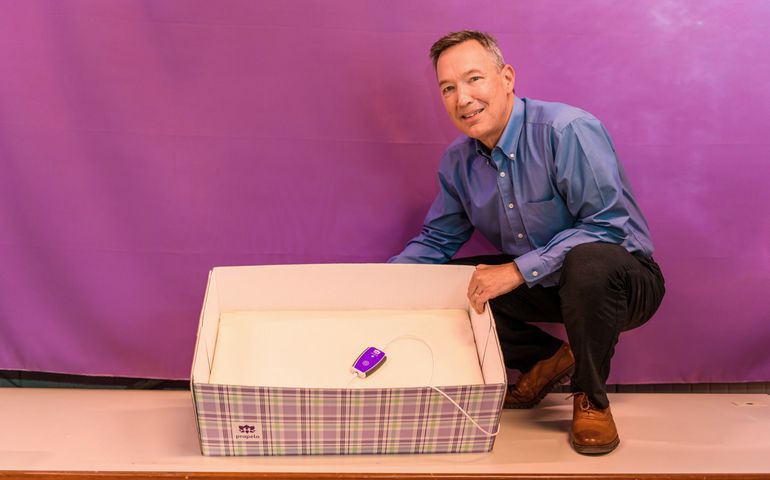On the Record: John Konsin's Biddeford startup, Prapela, is rocking the cradle
 Photo / Jim Neuger
John Konsin, CEO of Prapela, with a bassinet that helps newborns breathe, relax and sleep.
Photo / Jim Neuger
John Konsin, CEO of Prapela, with a bassinet that helps newborns breathe, relax and sleep.
John Konsin is the CEO and co-founder of Prapela, a Biddeford-based startup with Massachusetts roots that has pioneered a technology-enabled bassinet pad designed to help newborn babies breathe, relax and sleep. The company, which employs three people with plans for two more hires by summer, was recently awarded a $2.5 million grant from the National Institutes of Health. Mainebiz caught up with him to find out more.
Mainebiz: What brought you to Maine, and what are the main pluses of being based here?
John Konsin: We moved to Maine to be closer to [South Portland-based] Saunders Electronics, our manufacturing partner, and to enjoy the way life should be. Everything is a bit easier here. Any specialized support we need from the terrific Boston life science community is less than two hours away. Meanwhile, thanks to the Roux Institute, things are looking up in Maine for startups like Prapela that need cutting-edge talent.
MB: How does Prapela’s hospital bassinet pad work on opioid-exposed infants?
JK: As opioid-exposed newborns go through withdrawal they experience frantic breathing and racing heart rates. The unique vibration from our pad works by stabilizing activity in the brain that controls breathing and heart rate. With opioid-exposed babies, their fast breathing and heart rates slow down, becoming more healthy and rhythmic — which also helps them relax. What’s truly amazing is that the same bassinet pad shifts unhealthy slow breathing and heart rates to healthy rhythmic ones. It’s based on a relatively new field of science called stochastic resonance.
MB: Who will produce the pads, and how did you find a local manufacturer?
JK: Our bassinet pad is made from different parts sourced from companies in Massachusetts, Ohio, Michigan and Maine. Saunders Electronics makes one of the most critical parts and then puts everything together. Saunders also coordinates shipments directly to our customers.
MB: During the pandemic, how did you shift your business model?
JK: We started by trying to sell our pad to help healthy babies at home breathe, relax and sleep. It became impossible to demonstrate our product, so we decided to focus only on our ability to help opioid-exposed newborns. Since last June, we’ve been working on grants, coordinating with the FDA and preparing our application for clearance. We are also working to help preemies who have trouble breathing.
MB: How will you keep the product affordable to health care providers?
JK: We are making it simple, keeping production local, using a less expensive way to sell to hospitals, and we’re just committed to a low price so we can help more babies.
MB: Longer term, what are the plans to expand the customer base?
JK: In hospitals, we aim to expand beyond our initial FDA clearance and treat many different infant medical issues. After we earn recommendations from physicians, nurses and therapists and with proof from studies with healthy babies, we will work to earn the trust of parents for an at-home product. We believe our bassinet pad will improve the health of all newborns when used during their first 100 days.
MB: How significant is the $2.5 million NIH grant, and how will it be used?
JK: The NIH is funding a new study to see if our device can eliminate the use of morphine to treat some opioid-exposed babies. It will also help us understand how it helps newborns with less severe withdrawal symptoms. We have been incredibly fortunate. Most medical device startups need to raise millions from family, friends and investors to make prototypes, conduct clinical trials and apply for FDA clearance. With our latest grant from the NIH, we’ve received almost $5 million in awards. To get to this stage without traditional investors has been remarkable.
MB: After a career with established companies, what have you learned so far as a first-time entrepreneur?
JK: I’ve learned many things, but two lessons stand out: First, I’ve learned so much about grant opportunities that support small business innovation. Second, I’ve learned more about the hard, detailed work needed from every area in a company to make a safe medicinal product.









0 Comments